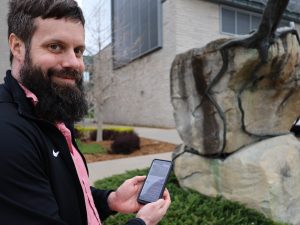 New Brock research into vulnerable person registries will shed light on the uses and implementation of the tool.
New Brock research into vulnerable person registries will shed light on the uses and implementation of the tool.Lisa Whittingham (BA ’07, MA ’17) wants to know how to create better outcomes when police encounter people with intellectual or developmental disabilities.
The PhD student in Child and Youth Studies (CHYS) says that when we read headlines about a vulnerable person being injured by a police officer, it’s important to understand all of the reasons why it happened.
“We’re looking at this one horrible moment, but a lot of things happened to get us to that moment,” she says. “There are so many different layers shaping how and when these interactions happen, and social variables may be ignored if we stay too focused on that single moment rather than looking at the complexities that led to it.”
Whittingham is researching autism registries and vulnerable person registries, which have been implemented by various police services in Ontario over the past decade. But there is no standard or training package for using a registry.
“The registries are promoted as an opportunity to enhance the safety of people with autism or other vulnerable people, like those with Alzheimer’s, in the community, so I think it’s really important to think through and try to understand exactly what is happening with them,” she says.
CHYS Professor and Director of Brock’s Forensic Psychology and Criminal Justice program Voula Marinos is Whittingham’s supervisor. She says that Whittingham’s multidimensional and multidisciplinary approach will support research, policy and practice.
“There have been some high-profile and tragic cases very recently in the media about cases of persons with autism being misidentified by police and responded to in harmful ways, so we are at a tipping point, I would say,” says Marinos. “Lisa’s research will be valuable to gain more insight into the complexities of autistic-police interactions.”
To complete her dissertation, Whittingham will look at if and how problems are conceptualized and solved by vulnerable persons registries, how a registry may influence the decision-making of police officers and how other stakeholders, including people with autism and caregivers, respond to the registries.
“We don’t know what a lot of key players think,” says Whittingham. “The voices of people with disabilities are so important, and it’s also important to create space for caregivers, many of whom have advocated for the registries because they fear for their children. We want to ensure that the registries are useful for police, respect the concerns of caregivers and respect the rights of the person who is going to be registered, especially if that person can’t consent.”
Whittingham herself spent several years working as a clinician and behavioural therapist with adults with intellectual and developmental disabilities before beginning her current degree. She says that over time, she noticed discrepancies when individuals she treated encountered police and moved through the justice system.
“Some police officers were comfortable using informal diversion and trying to respond to situations differently, especially if there was a behaviour support plan and behaviour therapist in place — they would agree to try that route rather than the justice system,” says Whittingham. “Whereas other officers didn’t seem to have that willingness and would proceed with charges against the person, possibly in the hopes that the justice process would result in changes in behaviour.”
Now Whittingham is driven to “tease apart” the complexities of the registries, which have not been studied in this way, because there are so many factors to consider, including systemic challenges for individuals with disabilities like long wait lists for services and housing or limited employment opportunities.
“It’s really important to understand how these conditions can contribute to why a vulnerable person might come to the attention of police,” she says.








